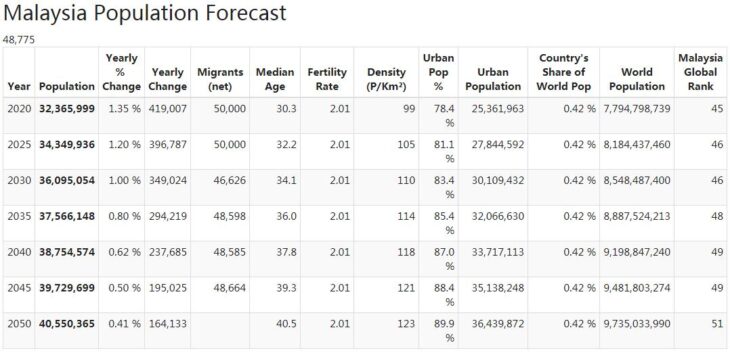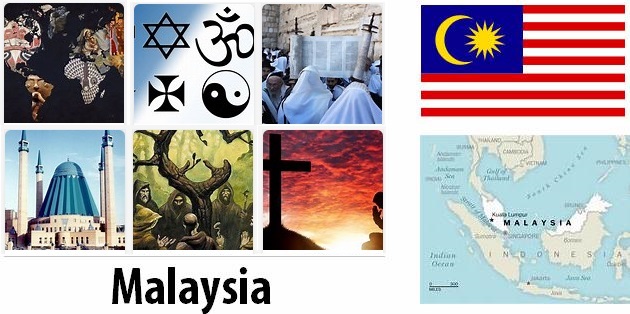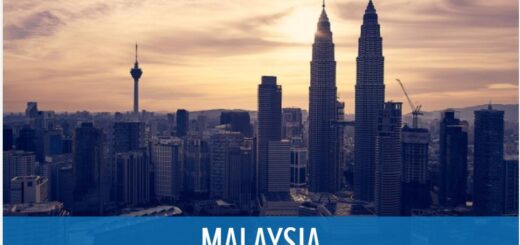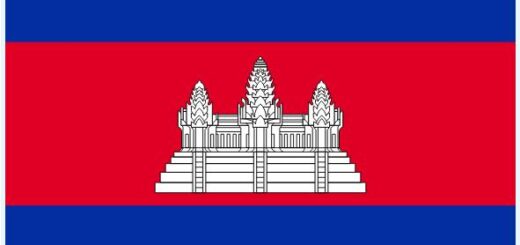Malaysia Religion
About three-fifths of Malaysia’s population are Muslims, and Islam is state religion. The constitution guarantees freedom of religion, but since Islam is so closely associated with the ethnic identity of the Malays, in practice Islam is favored over other religions.
It says on the Malaysian ID cards if you are a Muslim and it is virtually impossible for a Muslim to convert. However, persons belonging to other religions may convert to Islam. Non-Muslims may not work actively to convert Muslims to other religions, while Muslims may work to convert non-Muslims to Islam. Societies that belong to other religions claim that discrimination exists, including when it comes to permits to build churches. Several Hindu temples have been demolished for lack of building permits.
Discrimination also affects Muslims who do not follow the Sunni beliefs accepted by the government. Reportedly, the government has a secret list of some 50 Muslim “sects” who are seen as deviating from the true faith. This belongs to the country’s Shia Muslims.
Malay Islam has been influenced by Hinduism and religious beliefs and has been applied less strictly than Islam in the Arab world. But since the 1980s, Malay Islam has been influenced by fundamentalist currents. More and more women are wearing veils and the religious police are checking that Muslims do not drink alcohol, wear challenging clothes, read banned books or hang out with someone of the opposite sex. For Muslim citizens, special laws apply, especially in family law, but religious influence varies between different states.
Tensions between Muslims and non-Muslims have increased since the turn of the millennium. In addition, liberal Muslims are turning to the fundamentalists’ quest to control the lives of their cousins. An important issue for the liberals is that even Muslims should have the right to renounce their faith and adopt another religion.
In 2007, a conflict arose over the right to the word Allah (Arabic for God). The government banned non-Muslims from using “Allah” since the Christian newspaper The Herald did so in its Malay language edition. The Catholic Church turned to a court, but after several trips, the decision in 2015 was upheld by the country’s highest court.
- Countryaah: Population statistics for 2020 and next 30 years in Malaysia, covering demographics, population graphs, and official data for growth rates, population density, and death rates.
Population composition
Over 50 population groups live in Malaysia. Around 60% of the population are Malays. They belong to the Indonesians who mostly immigrated from Indonesia in the last few centuries. They have been claiming political leadership since the state became independent. The government promotes and favors them.
With a population of around 30%, the Chinese are the largest minority. They are Buddhists, Confucians, or Daoists. 10% of the population are Hindu Indians or Pakistanis. 6% are Christians who are mainly concentrated in Sabah and Sarawak. Around 55% of the population profess Sunni Islam, the “official religion in the state”, but it is not the state religion.
Population distribution
The population distribution is very uneven. Around 80% of the 20 million residents in West Malaysia live on around 40% of the national territory. The west coast of the Malay Peninsula is particularly densely populated. Most of the major cities of Malaysia and the capital are located here.
Due to increasing industrialization, a strong rural exodus and urbanization began in Malaysia. In the mid-1990’s, every second Malay lived in the city.
Population growth and education
The government understands how to curb the population growth of around 2.5% through family policy measures. Although the level of education has risen considerably in the last few decades, the illiteracy rate is 15%. There is compulsory schooling for nine years. The school systems are different for the different ethnic groups.
The Chinese in Malaysia can be Buddhists, Confucians or Daoists, and many adhere to a mixture of these teachings. Indians are usually Hindus, while a minority are Sikhs. There are also Christian Indians and Chinese. In the interior of Sabah and Sarawak there are dajaks who hold on to religious belief (animism), but most have, at least on the surface, adopted Christianity, or in some cases Islam. In East Malaysia, Christians make up a much larger proportion of the population than in Western Malaysia – between a quarter and a third. In total, about a tenth of Malaysians are Christians.
2015
December
New criticized security law
Parliament adopts a new security law that gives the government far-reaching powers to prevent security threats. A council headed by the Prime Minister should be able to introduce emergency permits, which would mean that people can be arrested without arrest warrants and that the house search can be carried out and property can be seized without permission. Critics say the law restricts fundamental freedoms and guides the country in the direction of dictatorship.
October
“Malaysia is increasingly a police state”
Human Rights Watch (HRW) releases the “Creating a Culture of Fear” report on the situation in Malaysia. According to HRW, the country is increasingly similar to “a police state”, where the government uses oppressive methods and laws to silence critics. The most difficult is the situation according to HRW for opposition politicians, civil society groups and government-critical media. According to the report, the attacks against regime critics began to increase in numbers after the government’s poor election results in 2013 and have been exacerbated by the trips around the 1MDB scandal. According to HRW, more than 200 people have been arrested or interrogated by the police since the 2013 elections for criticizing or challenging the government.
The TPP Free Trade Agreement is signed
The Trans Pacific Partnership (TPP) Free Trade Agreement is signed after five years of negotiations between twelve countries: USA, Japan, Australia, New Zealand, Canada, Mexico, Peru, Chile, Vietnam, Singapore, Brunei and Malaysia. Later, Indonesia also announces that the country will sign the TPP. The agreement covers 40 percent of the world economy and standardizes trade in the area and significantly reduces barriers to trade (lower import duties etc). For the agreement to come into force, the national parliaments of the countries must adopt the agreement.
The plane was shot down in eastern Ukraine
The Dutch Accident Investigation Board presents its final report on the Malaysian passenger aircraft that crashed in eastern Ukraine in July 2014. The plane was hit by the detonation of a Russian-made missile that exploded in the airspace to the left of the cockpit. In the detonation, the aircraft body was split into two parts. The Accident Investigation Board does not identify anyone guilty of the shooting but notes that it happened over a rebel-controlled area.
September
Hope’s alliance is formed
Some opposition parties are joining forces in the new Hope Alliance (Pakatan Harapan), whose main goal is to reach a solution to the “leadership crisis in which the country is in”. The alliance appoints imprisoned Anwar Ibrahim as its candidate for the Prime Minister’s post in the 2018 election. PAS chooses to stand outside Hope’s alliance.
Continued demonstrations
Demonstrations are held, both for and against the government. Kravall police disperse a government-friendly demonstration using water cannons.
Mahathir Mohamad participates in government-critical protests
The Bersih Alliance, which brings together Malaysia’s leading NGOs, reform activists and human rights groups, is conducting a peaceful mass demonstration over two days in three major cities, including Kuala Lumpur. The protesters demand Prime Minister Najib Razak’s departure because of the 1MDB scandal. Joining the streets is former Prime Minister Mahathir Mohamad. The government describes the demonstration as illegal and threatens to block all internet sites that disseminate information about it. According to the government, the demonstration threatens the country’s stability and damages the country’s reputation.
August
New mass graves are discovered
Police discover mass graves with a total of 24 bodies in the state of Perlis near the Thailand border. The bodies are feared to be refugees held hostage by criminal contraband leagues. In May of the same year, similar mass graves with a total of 139 bodies were found on the Thai side of the border. The discovery prompted Thai police to step up efforts against human traffickers, resulting in a refugee crisis in the region during spring and summer (see also Thailand, calendar).
Ten arrested for conspiring with IS
Police arrest ten people suspected of conspiring with Islamic State (IS). According to authorities, so far 108 people in the country have been arrested for suspected links to IS. For example, they should have tried to reach the war hardens in Syria and Iraq to wage war on IS’s side or planned terrorist acts in Malaysia in the name of the group.
New finds in the search for lost passenger plane
An aircraft wing flying ashore on the French island of Reunion east of Madagascar appears to belong to Malaysian Airlines aircraft MH370, which disappeared without a trace in March 2014. The wreck finds that the plane most likely crashed in the Indian Ocean.
Najib Razak cleansed in the 1MDB scandal
The Anti-Corruption Authority states that the $ 700 million transferred from the 1MDB Fund to Prime Minister Najib Razak’s personal account is a legal donation. Najib Razak is thus cleansed from corruption suspicions (see July 2015).
July
Criticism of Russia
Russia vetoes UN Security Council against the establishment of an international court to investigate those responsible for the shooting of a Malaysian passenger plane over eastern Ukraine in 2014. Malaysia, EU, Netherlands, US and Australia are among those who sharply criticize Russian veto. Russia claims it is too early to start investigating any before the international investigation into the crash is over.
Najib Razak in scandal surrounding the 1MDB fund
Prime Minister Najib Razak ends up in blustery weather as a corruption scandal is rolled up around the state fund 1MDB. About $ 700 million should have been transferred directly from the fund to Najib Razak’s personal account. The prime minister denies the task and says it is about “political sabotage” against him. The Deputy Prime Minister and four other ministers are dismissed when they criticize Najib Razak for handling the 1MDB scandal. The Prosecutor General, who is in the investigation of the scandal, is also being kicked by the Prime Minister. 1MDB was formed by Najib Razak in 2009.
June
The public front is shattered
The public front is split after a quarrel between two alliance parties. The controversy erupts when Malaysia’s Islamic Party (PAS) presents a proposal to impose Islamic legislation on certain crimes (hudud) in a state that dominates the party. The proposal is rejected by the Chinese-dominated Democratic Action Party (DAP), which has a more liberal appearance.
April
UN criticism for stricter punishment for revival
Malaysia receives criticism from the UN as Parliament tightens the penalty for rioting and insurgency from a maximum of three years in prison to ten years. It also becomes illegal to propagate for insurgency on the internet.
Opposition to opposition politicians
The prison sentence against Anwar Ibrahim is followed by a series of police attacks against opposition politicians and journalists. According to human rights organizations, more than 90 people are detained during the days around the end of the month of March / April. Many of them are arrested under a colonial law that criminalizes speeches that have “upward tendencies”.
New tightened terrorist law is adopted
Parliament adopts a law that allows the arrest of suspected terrorists for up to two years without prosecution; Thereafter, the arrest warrant can be extended an unlimited number of times. It will also be easier for the authorities to withdraw various travel documents if terrorist suspicions can be directed at a person. This applies to both Malaysians and foreign nationals. The new law is motivated by an increased terrorist threat to the country and pushed through just hours after the police announced the revealed terror plans in Kuala Lumpur.
Terror plans are revealed
The Chief of Police announces that 17 people have been arrested in the attack against militant Islamists with ties to the Islamic State (IS). The arrested must have planned a series of attacks against “strategic targets” in Kuala Lumpur as well as against army camps and police stations in search of weapons. The perpetrators, who are said to belong to the domestic group KMM (Kumpulan Militan Malaysia, about the Malaysian militant group), should also have planned to carry out robberies and kidnappings. The leader of the KMM should be among the arrested. He is a 45-year-old who participated in the war in Syria on the IS side and also received military training in Afghanistan and Sulawesi in Indonesia.
March
Parties oppose Hudud’s decision
Contradictions arise in the Popular Front when the Islamist PAS votes to introduce skinud (a strict form of Sharia law) in the state of Kelantan. Hudud is adopted since the proposal was supported by Umno in the state. The Chinese-dominated DAP, which, like PAS, is part of the People’s Front, strongly opposes the decision to impose dermatology.
Anwar Ibrahim loses his seat in parliament
After being denied the five-year jail sentence, Anwar Ibrahim’s application for mercy with the king is also rejected. This means that the incarcerated opposition leader loses his seat in parliament.
January
The disappearance of the plane is referred to as an accident
The Malaysian authorities formally designate the disappearance of an aircraft from Malaysia Airlines on March 8, 2014 as an accident, which means that relatives of the victims can initiate damages (see March 2014).



